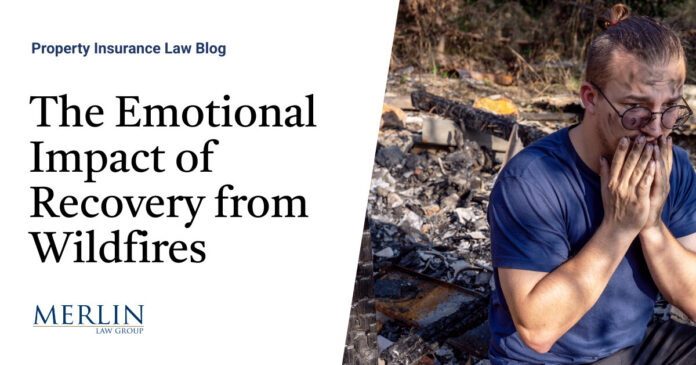Can you imagine going through the burned debris of what used to be your business or home, looking for anything that may be left of important sentimental value? Little things of personal property carry immense emotional value to us because they often serve as tangible symbols of our intangible experiences, relationships, and identities. When speaking with survivors, clients and others in a devastated community, I remind our attorneys and teach others in the claims industry that most are often experiencing profound grief, stress, and even trauma. Most individuals aren’t just looking to rebuild their homes; they’re grieving the loss of irreplaceable memories, cherished possessions, and a sense of security.
The emotional toll of losing everything is profound. Family heirlooms, photographs, a child’s first drawings, a wedding dress—all gone in an instant. While insurance policies may cover some of the financial loss, no amount of money can replace the sentimental value attached to these personal items. Many clients struggle with grief, anger, and anxiety. Some feel overwhelmed and don’t know where to begin, while others are frustrated with insurance companies, contractors, or the legal process itself. Many face financial uncertainty, unsure of whether they will ever be able to rebuild what was lost. Recognizing and acknowledging these emotions allows attorneys to serve their clients with greater sensitivity and effectiveness.
United Policyholders noted an article from Live Insurance News:
Even beyond the loss of property, survivors of wildfires encounter a staggering emotional toll. Imagine standing amid the ashes of what was once your home — memories reduced to dust, and the sheer scale of rebuilding feeling insurmountable. Under such circumstances, providing a detailed list of every item lost, from socks to family heirlooms, can feel not only impossible but also cruel.
By asking insurers to ease documentation requirements, Commissioner Lara seeks to humanize the claims process. This approach allows survivors to use their energy where it’s most needed — stabilizing their families and beginning the long road to recovery.
Residents like Emily, whose family home was destroyed in the Palisades fire, echo this frustration. ‘The last thing I could think about was an inventory list. All I wanted was to find a sense of normalcy for my kids. Getting part of our coverage without that burden was a blessing,’ she shared.
John Putnam published an article, Los Angeles Wildfires: A Debris Removal Megaproject, where he noted:
Wildfire survivors should consider sifting through the ashes and debris on their property to find any surviving contents. In the Colorado wildfires, the Samaritan’s Purse offered this service at no cost to survivors. Many homeowners wanted to use free sieves offered by local hardware stores. People doing their sifting should wear masks, gloves, hard-sole shoes, and other protective clothing to minimize injury to themselves. They should also limit their expectations of finding many unburned objects, but most survivors found some items from the ashes, which made the effort worthwhile and gave them closure. Despite its emotional impacts, whole families and their friends participated in this task. They found items that they either could save or incorporate in some way into their newly rebuilt home. Their stories of this task mark another early milestone in the recovery process because it now focuses them more squarely on the future work of rebuilding. 1
From my personal experience, this is one of the most traumatic experiences people suffer through long after they initially do this task. Clients and survivors will re-live these moments for a long period of time, if not their entire lives. I am at a loss other than to listen a lot more and speak a lot less at these times. I am certain that it is more important to let them express their frustrations, fears, and grief without shifting to any legal talk. During these times, it is essential to remember that many may struggle to remember details or make decisions.
The Emotional and Mental Health Damages from Natural Disasters and Climate Change stated:
If you are dedicated to professionally helping people, bettering yourself, and assisting those in need with compassion and letting the dollars come from the fruit of your labor rather than looking to make a killing, chances are you are the type of professional reading this blog. Policyholders and the public should know that there are many dedicated people ready to help and want to do so in a compassionate manner.
For all of us who are in this claims business because we want to help people, we need to study and learn how to help our clients through the often non-financial aspect of emotional recovery while acting in our professional capacity.
Thought For The Day
“Traveling from one disaster to another and talking with those involved and living through the impact is difficult. Most people need reassurance that others know, understand and care. Others are understandably frustrated and angry with the entire situation. When talking with seasoned catastrophe adjusters, virtually all have stories of just staying, sitting and holding hands with our brothers and sisters as they sob and then get to the point of being able to function.”
—Chip Merlin, from Tennessee Floods and The Emotion of Disaster
1 John E. Putnam, Los Angeles Wildfires: A Debris Removal Megaproject, IRMI, Feb. 7, 2025. Available online at https://www.irmi.com/articles/expert-commentary/los-angeles-wildfires-a-debris-removal-megaproject

